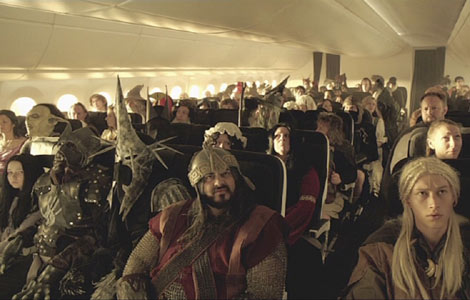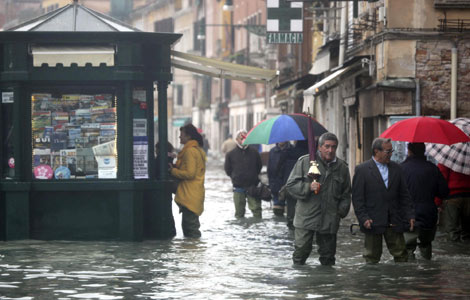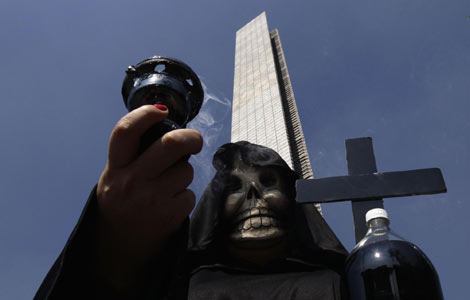
HEMPSTEAD, United States - US President Barack Obama and his Republican challenger Mitt Romney fired up over economic issues Tuesday in the second presidential debate, which was held just three weeks before the November election.
![US Republican presidential nominee Mitt Romney (L) shakes hands with President Barack Obama at the start of the second US presidential debate in Hempstead, New York, Oct 16, 2012. [Photo/Agencies] Obama, Romney spar over economic issues in 2nd debate](../../images/attachement/jpg/site1/20121017/0013729e4ad911e8bbd013.jpg) |
|
US Republican presidential nominee Mitt Romney (L) shakes hands with President Barack Obama at the start of the second US presidential debate in Hempstead, New York, Oct 16, 2012. [Photo/Agencies] |
Stakes were high for both candidates as Obama tried hard to put his re-election bid back on track after a subdued performance in the first debate and Romney strived to keep the Republican momentum rolling.
As most of the time in the campaign trail, economic issues including jobs, oil prices and taxes dominated the debate.
In response to the first question about jobs for young people, Romney, who appeared to be sympathetic to the audience, stressed his idea of making college education more affordable and making it easier for students to get a job after graduation.
Obama in turn highlighted his plan to increase investment in education and touted the economic record that the private sector has added more than 5 million jobs in the past 30 months.
Romney blamed Obama for leaving about 23 million people still struggling to find a job. "We have fewer people working today than we had when the president took office... the unemployment rate was 7.8 percent when he took office, it's 7.8 percent now... But if you calculated that unemployment rate, taking back the people who dropped out of the workforce, it would be 10.7 percent," he said.
Romney reiterated his five-point plan which he argued would create 12 million new jobs in his first term and raise take-home income.
Obama replied that Romney has a one-point plan, which is to make sure that the top people play by a different set of rules. "That's been his philosophy in the private sector; that's been his philosophy as governor; that's been his philosophy as a presidential candidate," he said.
The two were also divided on energy plans. In response to a question about curbing the rising oil prices, Obama illustrated his plan on the development of new and clean energy while taking control of the domestic energy production.
"We can't just produce traditional source of energy," Obama said. "But we've also got to continue to figure out how we have efficiency energy, because ultimately that's how we're going to reduce demand and that's what's going to keep gas prices lower."
Obama used the question to attack Romney's energy plan, saying that Romney's so-called all-of-the-above plan is basically about letting the oil companies write the energy policies.
Romney, however, accused Obama of cutting licenses and permits for drilling on federal lands and in federal waters. He believed that in this way, Obama is keeping the country from taking advantage of oil, coal and gas.
The fiercest confrontation came when the debate moved to the tax issue. Answering a question about the feasibility of his tax cutting proposal, Romney said his plan is about growing economy and creating jobs, and he would not allow the top-earners to pay a small share of the total tax the nations collects.
Obama seized the chance to hammer Romney's stance of holding middle-class welfare hostage of the tax policy in favor of the wealthy. He said Romney's across-the-board tax cuts would cost about 5 trillion US dollars in tax revenue, but Romney failed to name the tax deductions and loopholes he could eliminate to fill the gap.
Romney, who insisted on bringing all the individual income tax brackets by another 20 percent on top of the Bush-era tax, combated the charge that his proposal is "mathematically impossible." But he failed to provide any further specifics. He then tried to shift the topic to the nation's ballooning deficits and debts which he used as evidence for the failure of Obama's economic stewardship.
The showdown could be a decisive moment for both candidates who recently have been deadlocked in the heated race. In a new poll released Tuesday before the debate, Gallup found 50 percent of those polled said they would vote for Romney if the election were held on the day, and that 46 percent would vote for Obama.
Obama seemed to have made up some lost ground in the debate, as the CNN poll showed afterwards that 46 percent of the debate watchers thought Obama won the debate while 39 percent thought Romney did a better job.







